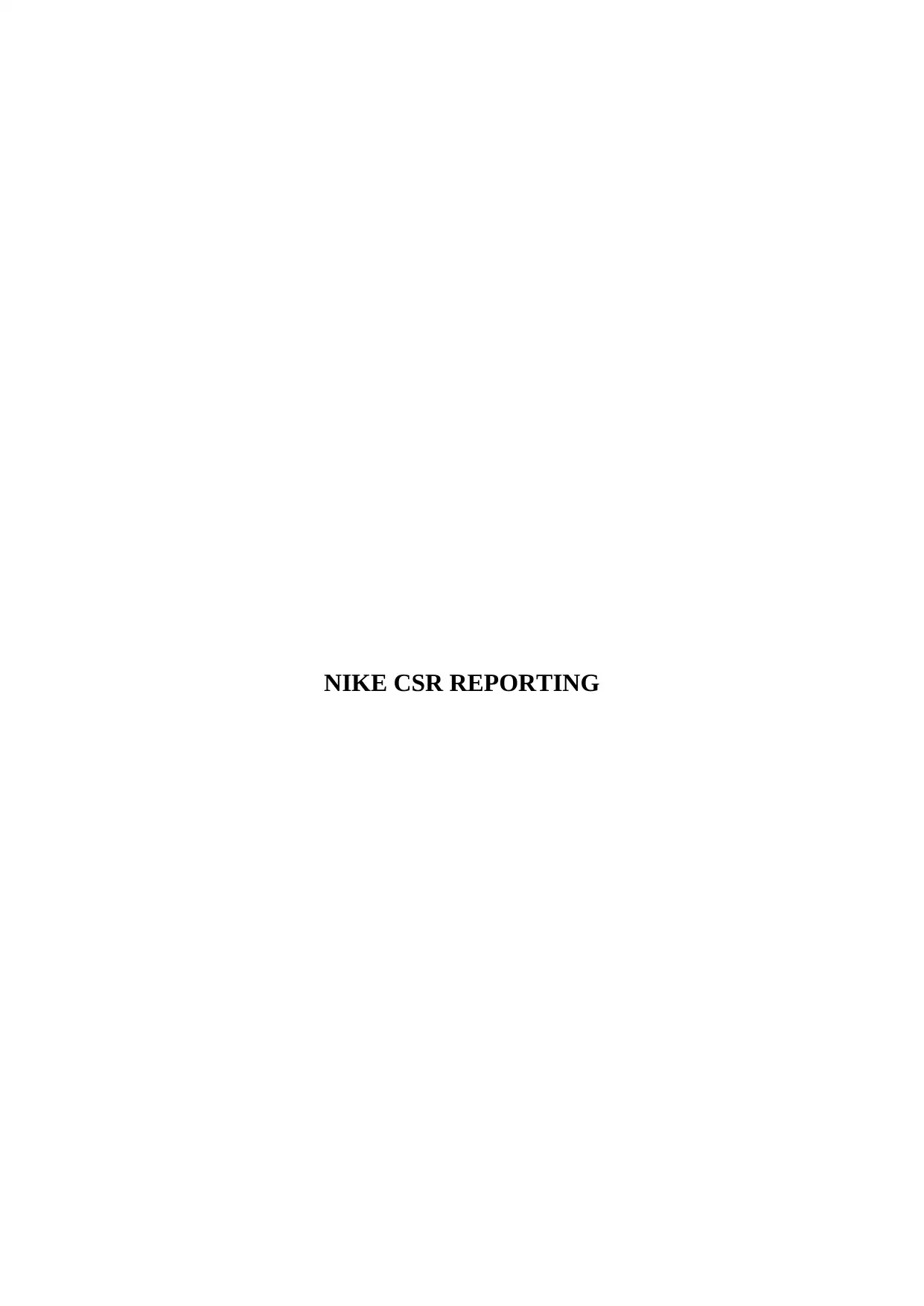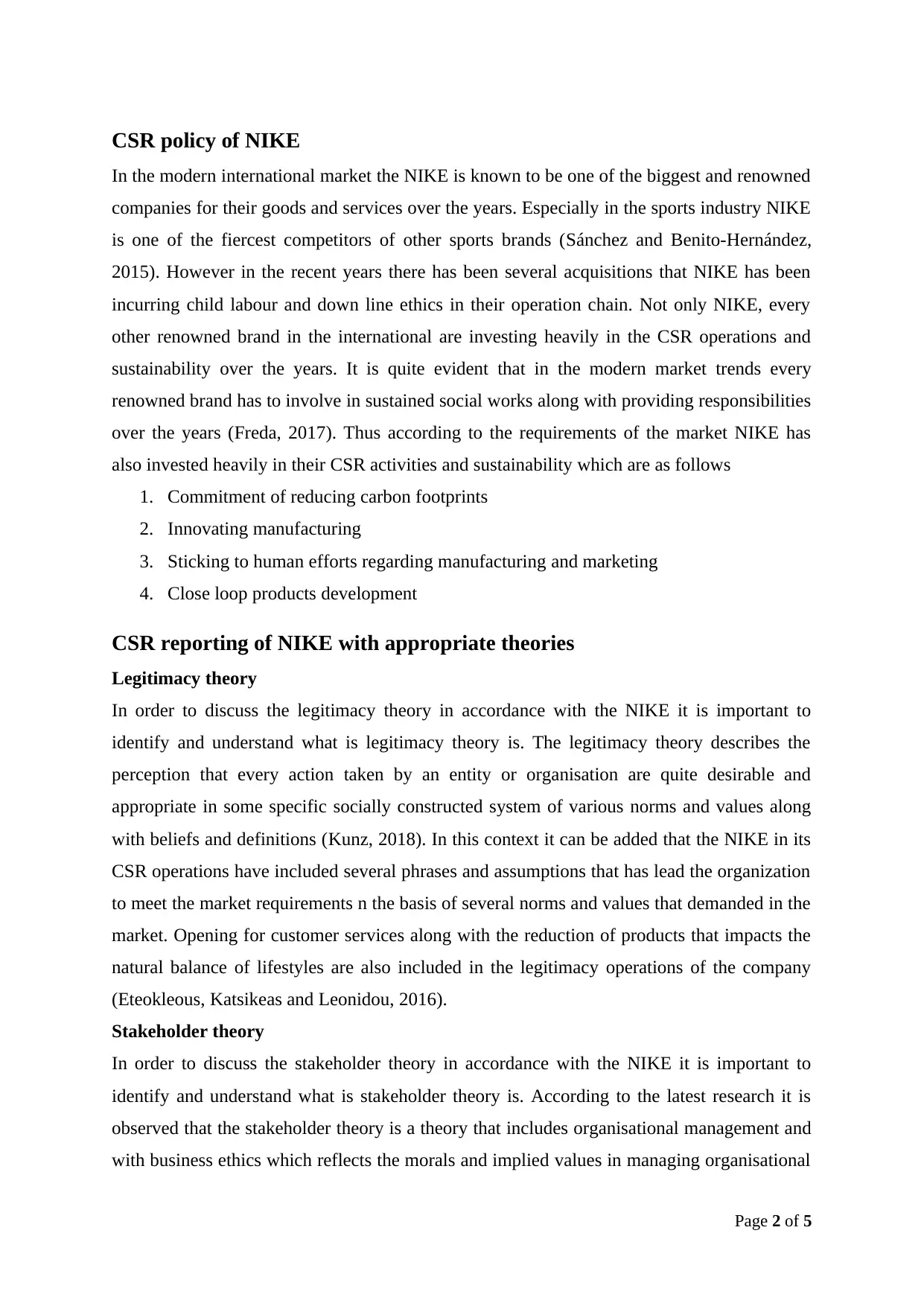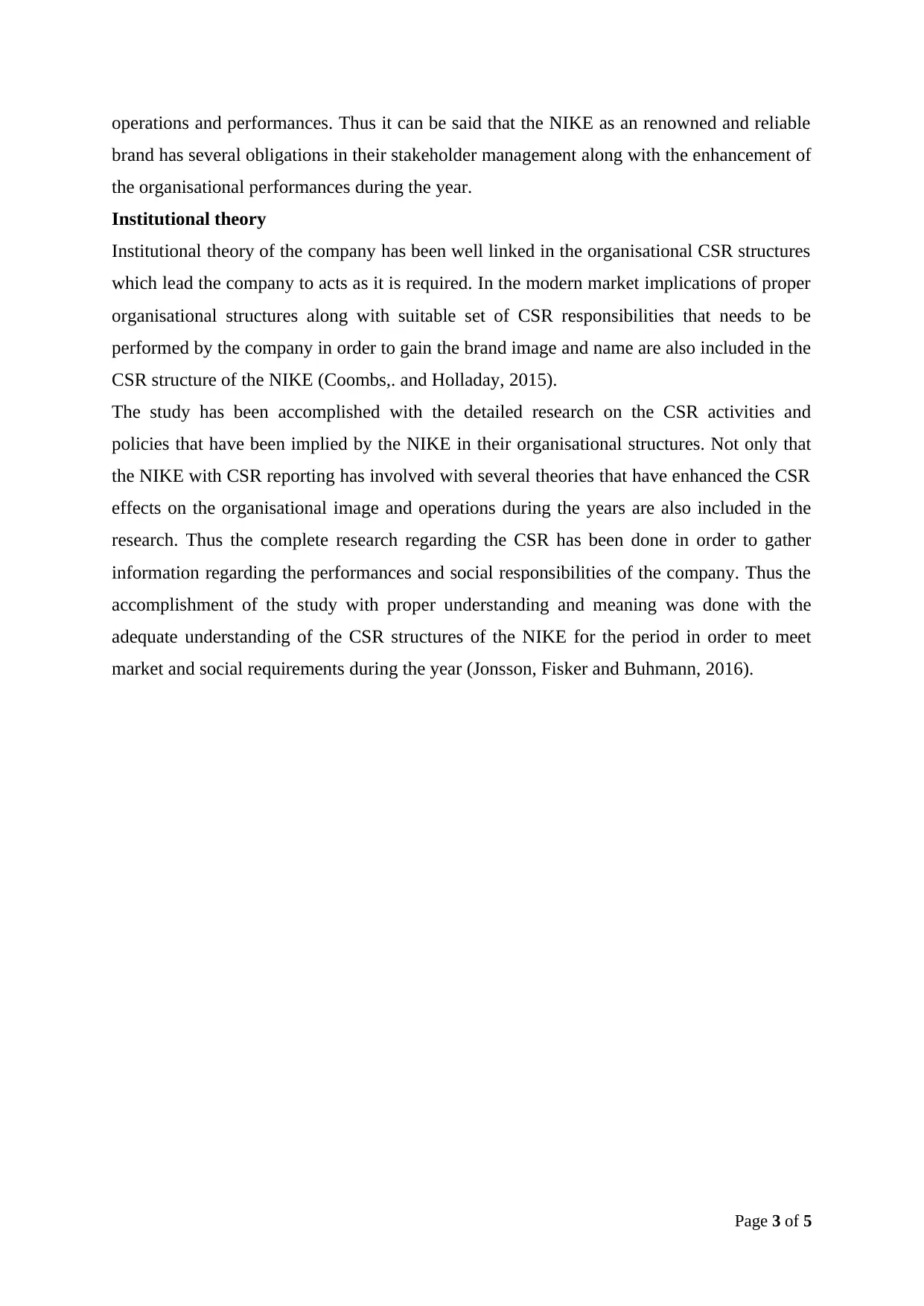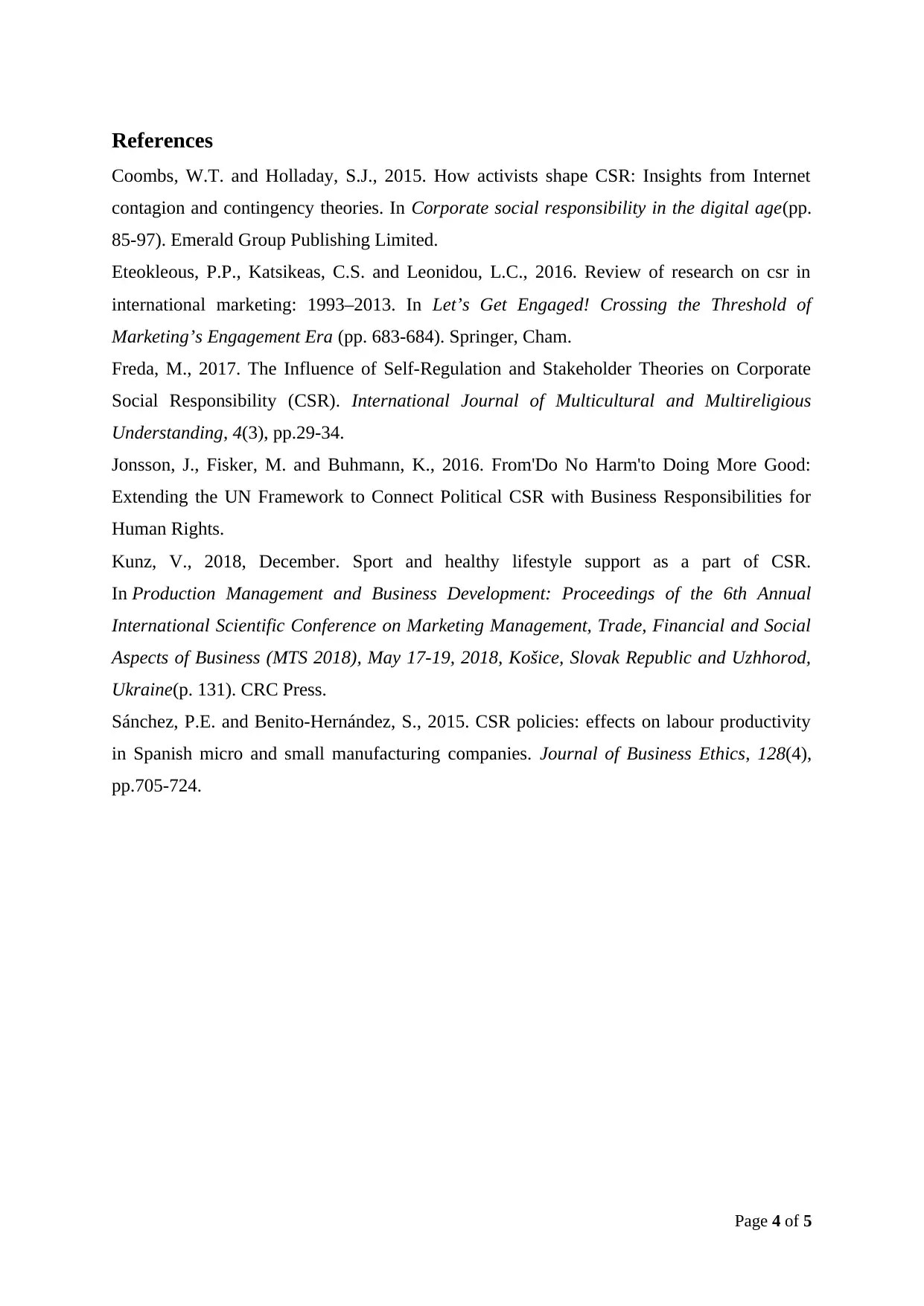NIKE's CSR Reporting: Policies, Theories, and Practices Analysis
VerifiedAdded on 2023/04/23
|5
|980
|228
Report
AI Summary
This report provides a comprehensive analysis of NIKE's Corporate Social Responsibility (CSR) initiatives. It begins with an introduction to NIKE's CSR policies, highlighting their commitment to reducing carbon footprints, innovating manufacturing processes, and ensuring ethical labor practices. The report then delves into NIKE's CSR reporting, examining how legitimacy theory, stakeholder theory, and institutional theory are applied within the company's operations. Legitimacy theory is discussed in the context of NIKE meeting market requirements through its CSR operations, while stakeholder theory emphasizes the company's obligations in stakeholder management and enhancing organizational performance. Institutional theory is explored in relation to NIKE's organizational structures and CSR responsibilities. The report concludes by summarizing the findings and referencing relevant academic sources that support the analysis of NIKE's CSR practices and their impact on the company's image and operations.

NIKE CSR REPORTING
Paraphrase This Document
Need a fresh take? Get an instant paraphrase of this document with our AI Paraphraser

Table of contents
Introduction................................................................................................................................2
CSR policy of NIKE..................................................................................................................2
CSR reporting of NIKE with appropriate theories.....................................................................2
Conclusion..................................................................................................................................3
References..................................................................................................................................4
Page 1 of 5
Introduction................................................................................................................................2
CSR policy of NIKE..................................................................................................................2
CSR reporting of NIKE with appropriate theories.....................................................................2
Conclusion..................................................................................................................................3
References..................................................................................................................................4
Page 1 of 5

CSR policy of NIKE
In the modern international market the NIKE is known to be one of the biggest and renowned
companies for their goods and services over the years. Especially in the sports industry NIKE
is one of the fiercest competitors of other sports brands (Sánchez and Benito-Hernández,
2015). However in the recent years there has been several acquisitions that NIKE has been
incurring child labour and down line ethics in their operation chain. Not only NIKE, every
other renowned brand in the international are investing heavily in the CSR operations and
sustainability over the years. It is quite evident that in the modern market trends every
renowned brand has to involve in sustained social works along with providing responsibilities
over the years (Freda, 2017). Thus according to the requirements of the market NIKE has
also invested heavily in their CSR activities and sustainability which are as follows
1. Commitment of reducing carbon footprints
2. Innovating manufacturing
3. Sticking to human efforts regarding manufacturing and marketing
4. Close loop products development
CSR reporting of NIKE with appropriate theories
Legitimacy theory
In order to discuss the legitimacy theory in accordance with the NIKE it is important to
identify and understand what is legitimacy theory is. The legitimacy theory describes the
perception that every action taken by an entity or organisation are quite desirable and
appropriate in some specific socially constructed system of various norms and values along
with beliefs and definitions (Kunz, 2018). In this context it can be added that the NIKE in its
CSR operations have included several phrases and assumptions that has lead the organization
to meet the market requirements n the basis of several norms and values that demanded in the
market. Opening for customer services along with the reduction of products that impacts the
natural balance of lifestyles are also included in the legitimacy operations of the company
(Eteokleous, Katsikeas and Leonidou, 2016).
Stakeholder theory
In order to discuss the stakeholder theory in accordance with the NIKE it is important to
identify and understand what is stakeholder theory is. According to the latest research it is
observed that the stakeholder theory is a theory that includes organisational management and
with business ethics which reflects the morals and implied values in managing organisational
Page 2 of 5
In the modern international market the NIKE is known to be one of the biggest and renowned
companies for their goods and services over the years. Especially in the sports industry NIKE
is one of the fiercest competitors of other sports brands (Sánchez and Benito-Hernández,
2015). However in the recent years there has been several acquisitions that NIKE has been
incurring child labour and down line ethics in their operation chain. Not only NIKE, every
other renowned brand in the international are investing heavily in the CSR operations and
sustainability over the years. It is quite evident that in the modern market trends every
renowned brand has to involve in sustained social works along with providing responsibilities
over the years (Freda, 2017). Thus according to the requirements of the market NIKE has
also invested heavily in their CSR activities and sustainability which are as follows
1. Commitment of reducing carbon footprints
2. Innovating manufacturing
3. Sticking to human efforts regarding manufacturing and marketing
4. Close loop products development
CSR reporting of NIKE with appropriate theories
Legitimacy theory
In order to discuss the legitimacy theory in accordance with the NIKE it is important to
identify and understand what is legitimacy theory is. The legitimacy theory describes the
perception that every action taken by an entity or organisation are quite desirable and
appropriate in some specific socially constructed system of various norms and values along
with beliefs and definitions (Kunz, 2018). In this context it can be added that the NIKE in its
CSR operations have included several phrases and assumptions that has lead the organization
to meet the market requirements n the basis of several norms and values that demanded in the
market. Opening for customer services along with the reduction of products that impacts the
natural balance of lifestyles are also included in the legitimacy operations of the company
(Eteokleous, Katsikeas and Leonidou, 2016).
Stakeholder theory
In order to discuss the stakeholder theory in accordance with the NIKE it is important to
identify and understand what is stakeholder theory is. According to the latest research it is
observed that the stakeholder theory is a theory that includes organisational management and
with business ethics which reflects the morals and implied values in managing organisational
Page 2 of 5
⊘ This is a preview!⊘
Do you want full access?
Subscribe today to unlock all pages.

Trusted by 1+ million students worldwide

operations and performances. Thus it can be said that the NIKE as an renowned and reliable
brand has several obligations in their stakeholder management along with the enhancement of
the organisational performances during the year.
Institutional theory
Institutional theory of the company has been well linked in the organisational CSR structures
which lead the company to acts as it is required. In the modern market implications of proper
organisational structures along with suitable set of CSR responsibilities that needs to be
performed by the company in order to gain the brand image and name are also included in the
CSR structure of the NIKE (Coombs,. and Holladay, 2015).
The study has been accomplished with the detailed research on the CSR activities and
policies that have been implied by the NIKE in their organisational structures. Not only that
the NIKE with CSR reporting has involved with several theories that have enhanced the CSR
effects on the organisational image and operations during the years are also included in the
research. Thus the complete research regarding the CSR has been done in order to gather
information regarding the performances and social responsibilities of the company. Thus the
accomplishment of the study with proper understanding and meaning was done with the
adequate understanding of the CSR structures of the NIKE for the period in order to meet
market and social requirements during the year (Jonsson, Fisker and Buhmann, 2016).
Page 3 of 5
brand has several obligations in their stakeholder management along with the enhancement of
the organisational performances during the year.
Institutional theory
Institutional theory of the company has been well linked in the organisational CSR structures
which lead the company to acts as it is required. In the modern market implications of proper
organisational structures along with suitable set of CSR responsibilities that needs to be
performed by the company in order to gain the brand image and name are also included in the
CSR structure of the NIKE (Coombs,. and Holladay, 2015).
The study has been accomplished with the detailed research on the CSR activities and
policies that have been implied by the NIKE in their organisational structures. Not only that
the NIKE with CSR reporting has involved with several theories that have enhanced the CSR
effects on the organisational image and operations during the years are also included in the
research. Thus the complete research regarding the CSR has been done in order to gather
information regarding the performances and social responsibilities of the company. Thus the
accomplishment of the study with proper understanding and meaning was done with the
adequate understanding of the CSR structures of the NIKE for the period in order to meet
market and social requirements during the year (Jonsson, Fisker and Buhmann, 2016).
Page 3 of 5
Paraphrase This Document
Need a fresh take? Get an instant paraphrase of this document with our AI Paraphraser

References
Coombs, W.T. and Holladay, S.J., 2015. How activists shape CSR: Insights from Internet
contagion and contingency theories. In Corporate social responsibility in the digital age(pp.
85-97). Emerald Group Publishing Limited.
Eteokleous, P.P., Katsikeas, C.S. and Leonidou, L.C., 2016. Review of research on csr in
international marketing: 1993–2013. In Let’s Get Engaged! Crossing the Threshold of
Marketing’s Engagement Era (pp. 683-684). Springer, Cham.
Freda, M., 2017. The Influence of Self-Regulation and Stakeholder Theories on Corporate
Social Responsibility (CSR). International Journal of Multicultural and Multireligious
Understanding, 4(3), pp.29-34.
Jonsson, J., Fisker, M. and Buhmann, K., 2016. From'Do No Harm'to Doing More Good:
Extending the UN Framework to Connect Political CSR with Business Responsibilities for
Human Rights.
Kunz, V., 2018, December. Sport and healthy lifestyle support as a part of CSR.
In Production Management and Business Development: Proceedings of the 6th Annual
International Scientific Conference on Marketing Management, Trade, Financial and Social
Aspects of Business (MTS 2018), May 17-19, 2018, Košice, Slovak Republic and Uzhhorod,
Ukraine(p. 131). CRC Press.
Sánchez, P.E. and Benito-Hernández, S., 2015. CSR policies: effects on labour productivity
in Spanish micro and small manufacturing companies. Journal of Business Ethics, 128(4),
pp.705-724.
Page 4 of 5
Coombs, W.T. and Holladay, S.J., 2015. How activists shape CSR: Insights from Internet
contagion and contingency theories. In Corporate social responsibility in the digital age(pp.
85-97). Emerald Group Publishing Limited.
Eteokleous, P.P., Katsikeas, C.S. and Leonidou, L.C., 2016. Review of research on csr in
international marketing: 1993–2013. In Let’s Get Engaged! Crossing the Threshold of
Marketing’s Engagement Era (pp. 683-684). Springer, Cham.
Freda, M., 2017. The Influence of Self-Regulation and Stakeholder Theories on Corporate
Social Responsibility (CSR). International Journal of Multicultural and Multireligious
Understanding, 4(3), pp.29-34.
Jonsson, J., Fisker, M. and Buhmann, K., 2016. From'Do No Harm'to Doing More Good:
Extending the UN Framework to Connect Political CSR with Business Responsibilities for
Human Rights.
Kunz, V., 2018, December. Sport and healthy lifestyle support as a part of CSR.
In Production Management and Business Development: Proceedings of the 6th Annual
International Scientific Conference on Marketing Management, Trade, Financial and Social
Aspects of Business (MTS 2018), May 17-19, 2018, Košice, Slovak Republic and Uzhhorod,
Ukraine(p. 131). CRC Press.
Sánchez, P.E. and Benito-Hernández, S., 2015. CSR policies: effects on labour productivity
in Spanish micro and small manufacturing companies. Journal of Business Ethics, 128(4),
pp.705-724.
Page 4 of 5
1 out of 5
Related Documents
Your All-in-One AI-Powered Toolkit for Academic Success.
+13062052269
info@desklib.com
Available 24*7 on WhatsApp / Email
![[object Object]](/_next/static/media/star-bottom.7253800d.svg)
Unlock your academic potential
Copyright © 2020–2026 A2Z Services. All Rights Reserved. Developed and managed by ZUCOL.





